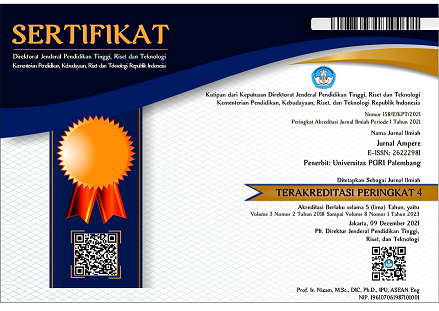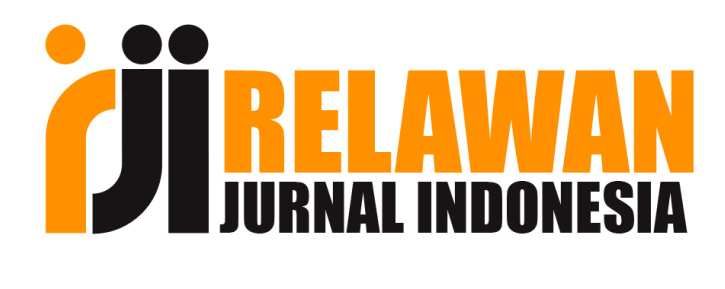Publication Ethics
Publication Ethics
Electrical Department, Engineering Faculty of Universitas PGRI Palembang as the publisher of Jurnal Ampere is responsible for all stages of publication and aware of the ethics and the other related things. We are committed that the advertisement, reprinted work and commercial income has no impact on the editorial decisions.
Duties of the Publisher
Jurnal Ampere editors are responsible for deciding which of the articles submitted to the journal should be published. The validation of the work and the importance for researchers and readers should always support the decision. The editors can be guided by the policy of journal editorial board and constrained by such legal requirements regarding defamation, copyright infringement and plagiarism. They may also confer with other editors or reviewers in making the decision.
Electrical Department, Engineering Faculty of Universitas PGRI Palembang, as the world's leading journal publisher, takes its duties of guardianship over the scholarly record extremely seriously. Our journals record "the minutes of science" and we recognise our responsibilities as the keeper of those "minutes" in all our policies [5 ], not least the ethical guidelines that we have adopted here.
Electrical Department, Engineering Faculty of Universitas PGRI Palembang is adopting these policies and procedures to support editors, reviewers and authors in performing their ethical duties under these guidelines. We work with other publishers and industry associations to set standards for best practices on ethical matters, errors and retractions.
Fair play
At any time, editors evaluate the manuscripts for their intellectual content without considering the race, gender, sexual orientation, religious beliefs, ethnicity, nationality, or author’s political philosophy.
Secrecy
Editors and any editorial staff must not disclose any information about the submitted manuscript to anyone other than the authors, reviewers, potential reviewers, other appropriate editorial advisors and publishers.
Disclosure and Conflict of Interest
Unpublished materials disclosed in a submitted manuscript must not be used in the editor's own research without the written consent of the author.
Duties of Editors
The editor of a learned journal is solely and independently responsible for deciding which of the articles submitted to the journal should be published, often working in conjunction with the relevant society (for society-owned or sponsored journals). The validation of the work in question and its importance to researchers and readers must always underwrite such decisions. The editor may be guided by the policies of the journal's editorial board and constrained by such legal requirements as shall then be in force regarding issues such as libel, copyright infringement and plagiarism. The editor may confer with other editors or reviewers (or society officers) in making these decisions.
The editor shall ensure that the peer review process is fair, unbiased, and timely. Research articles must typically be reviewed by at least two external and independent reviewers, and where necessary the editor should seek additional opinions.
The editor shall select reviewers who have suitable expertise in the relevant field, taking account of the need for appropriate, inclusive and diverse representation. The editor shall follow best practice in avoiding the selection of fraudulent peer reviewers. The editor shall review all disclosures of potential conflicts of interest and suggestions for self-citation made by reviewers in order to determine whether there is any potential for bias.
The editor should evaluate manuscripts for their intellectual content without regard to race, gender, sexual orientation, religious belief, ethnic origin, citizenship, or political philosophy of the authors. When nominating potential editorial board members, the editor shall take account of the need for appropriate, inclusive and diverse representation.
The editorial policies of the journal should encourage transparency and complete, honest reporting, and the editor should ensure that peer reviewers and authors have a clear understanding of what is expected of them. The editor shall use the journal’s standard electronic submission system for all journal communications.
The editor shall establish, along with the publisher, a transparent mechanism for appeal against editorial decisions.
The editor must not attempt to influence the journal’s ranking by artificially increasing any journal metric. In particular, the editor shall not require that references to that (or any other) journal’s articles be included except for genuine scholarly reasons and authors should not be required to include references to the editor’s own articles or products and services in which the editor has an interest.
The editor must protect the confidentiality of all material submitted to the journal and all communications with reviewers, unless otherwise agreed with the relevant authors and reviewers. In exceptional circumstances and in consultation with the publisher, the editor may share limited information with editors of other journals where deemed necessary to investigate suspected research misconduct.
Duties of Reviewers
Peer review assists the editor in making editorial decisions and through the editorial communications with the author may also assist the author in improving the paper. Peer review is an essential component of formal scholarly communication, and lies at the heart of the scientific method. In addition to the specific ethics-related duties described below, reviewers are asked generally to treat authors and their work as they would like to be treated themselves and to observe good reviewing etiquette.
Any selected referee who feels unqualified to review the research reported in a manuscript or knows that its prompt review will be impossible should notify the editor and decline to participate in the review process.
Contribution to Editorial Decisions
Peer review helps editors in making editorial decisions and assists the author in improving the paper through the editorial communications with the author.
Speed
Each of the selected referees who feel qualified to review the research reported in the manuscript or know that a quick review will be impossible should notify the editor and excuse himself from the review process.
Secrecy
Each manuscript is accepted for review must be treated as confidential documents. They should not be shown or discussed with others except as authorized by the editors.
Objectivity Standards
Reviews should be conducted objectively. Personal criticism of the author is inappropriate. Referee should express their views clearly with supporting arguments.
Source Recognition
Reviewers should identify relevant published work that has not been cited by the author. The statement that observation, derivation, or argument had been previously reported must be accompanied by relevant citations. Reviewers also have to call the attention of the editors that there is a substantial similarity or overlap between the manuscript under consideration and any other published papers.
Disclosure and Conflict of Interest
Privileged information or ideas obtained through peer review must be kept confidential and not used for personal gain. Reviewers should not consider manuscripts in which they have a conflict of interest due to a competition, collaboration or other relationships or connections with one of the authors, companies, or institutions regarding the papers.
Duties of Authors
Reporting standards
Authors should present an accurate account of the work and the discussion of its purposes. The underlying data must be accurately represented in the newspaper. A paper should contain sufficient details and references to permit others to replicate the work. Report fraudulent or intentionally inaccurate report is unethical behavior and unacceptable.
Originality and Plagiarism
The authors should ensure that they have written entirely original works. If the authors have used the work and/or words of others, they must have been appropriately cited or quoted.
Redundant or Concurrent Publications
A writer should not generally publish the manuscript depicting essentially the same research in more than one journal or primary publication. Submitting the same manuscript to more than one journal concurrently is unethical publishing behavior and unacceptable.
Source Recognition
Proper recognition of the work of others should always be given. Authors must cite publications that have been influential in determining the nature of the work being reported.
Authorship of the Paper
Authorship should be limited to those who have made significant contributions to the conception, design, implementation, or interpretation of the study reported. All those who have made significant contributions should be listed as co-authors. No one who has not participated in certain substantive aspects of the research project should be acknowledged or listed as contributors. Corresponding author should ensure that all appropriate co-authors have seen and approved the final version of the paper and have agreed to submission for publication.
Disclosure and Conflict of Interest
All authors should disclose in their manuscript any substantively financial conflict or other interest that might be construed to influence the results or interpretation of their manuscript. All sources of financial support for the project should be disclosed.
Fundamental Errors in Published Works
When the authors found a significant error or inaccuracy in his / her own work, it is the obligation of the author to promptly notify the journal editors or publisher and cooperate with them to retract or correct the paper.






